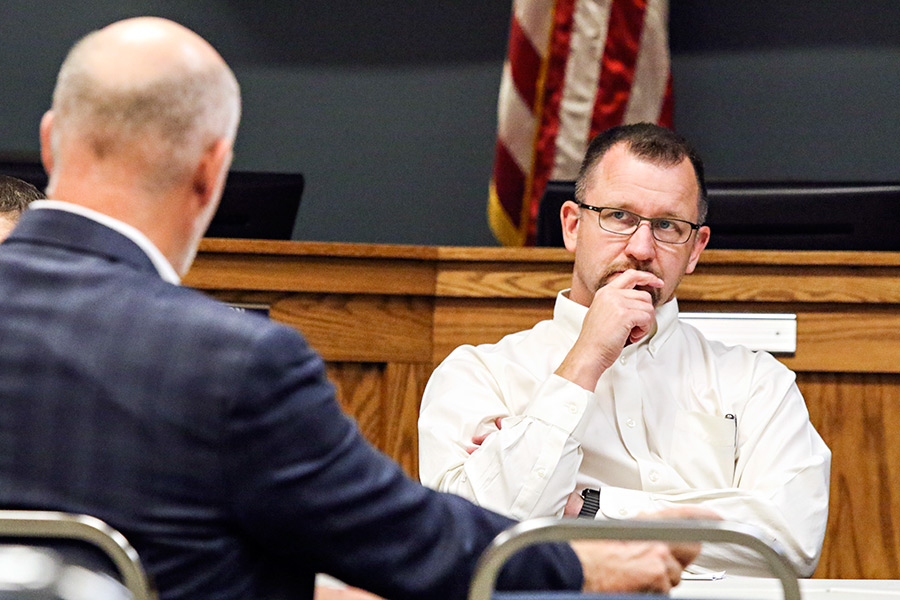Members of the Kalispell City Council expressed frustration over pushback from the Flathead County Commission regarding proposed changes to Main Street and referenced one of the commissioner’s legal troubles, signaling tighter tension between the two local governing bodies.
Near the conclusion of a meeting in City Hall on Tuesday night, Councilor Rod Kuntz raised issue with a letter the commission sent to the city last month. Kuntz said the county was hampering the city’s plans for downtown Kalispell.
“I tend to stay out of their business even though I have opinions of things outside of Kalispell. I don’t venture into that,” Kuntz said.
In the letter, the three county commissioners — Phil Mitchell, Pam Holmquist and Gary Krueger — said they oppose Kalispell’s tentative goal to reduce Main Street to two traffic lanes. Kalispell is finalizing a plan that seeks to improve the vitality of downtown. One of the proposals aims to address traffic congestion by reducing Main Street from four lanes to two lanes and a center turn lane. The city would also like to maintain traffic around the courthouse to two lanes.
The Montana Department of Transportation has raised concerns about limiting traffic on Main Street, which doubles as U.S. Highway 93, and has proposed doing the opposite by increasing to four lanes around the courthouse.
The county commission is siding with the state agency, saying the reduced lanes would hinder commuters and tourists and force more traffic onto Willow Glen, a county road.
Kuntz said he does not believe the commission understands the mission and vision that Kalispell has spent years developing, nor does it understand how widening the so-called courthouse couplet would harm downtown.
Using a metaphor “at least a third of the commission will probably understand,” Kuntz said the county’s stance “would be like girdling the city of Kalispell.”
Girdling is a tactic for killing trees that involves removing a thick strip of bark from a tree’s circumference, causing it to die. Commissioner Mitchell is accused of girdling six cottonwood trees on a county-owned parkland near his home on Whitefish Lake and was charged with felony criminal mischief. He admitted to killing the trees and apologized in a letter to the county but defended his actions by saying “cottonwoods are a substantial nuisance.” He pleaded not guilty in district court on Aug. 31.
Mayor Mark Johnson raised similar concerns about the county’s stance, saying he was disappointed that the commission does not see eye-to-eye with Kalispell. He referenced a recent conversation with Montana U.S. Sen. Jon Tester that brought up the longstanding dispute between Whitefish and Flathead County over the so-called planning doughnut. That controversy involved the county raising issue with Whitefish governing residents outside city limits.
Johnson likened the issue to Flathead County and Kalispell now disagreeing over the city’s plans for its downtown. He concluded by appearing to address Mitchell’s charges in an indirect way.
“I do want to remind everybody that we do take an oath to abide by the rules and laws that we enact as citizens. I want my council to know that if I am ever found in that position, where I’m violating one of these in a criminal way, I will resign,” he said. “So I take that serious, that these are laws that we put in place, and I think as an elected official we cannot hold ourselves above the law in any way in any form or fashion.”
The comments on Tuesday are the latest illustration of tensions boiling over between the jurisdictions. At a meeting in June, a group of Kalispell councilors attended a Flathead 911 Emergency Communications Center meeting and restated their displeasure for the funding setup that fuels the consolidated emergency services dispatch facility.
A taxpayer in Kalispell currently contributes to the city’s portion of funding for the 911 center. That same resident also pays taxes to the county for its part of the bill. The situation is similar in both Whitefish and Columbia Falls, where taxpayers essentially make two payments for the center. Yet residents outside these municipalities, in towns like Bigfork, Evergreen and Lakeside, only contribute to the county’s portion of funding.
Kalispell officials have also voiced their frustration over an apparent disparity in who pays for the city’s infrastructure demands as the largest regional center. Kalispell officials say residents inside city limits are bearing the brunt of paying for road maintenance, city services and other projects that people in the surrounding area, including county residents and tourists, also benefit from. The city has sought the ability to explore a local option sales tax but has been unable to convince state legislators to rewrite state law.
